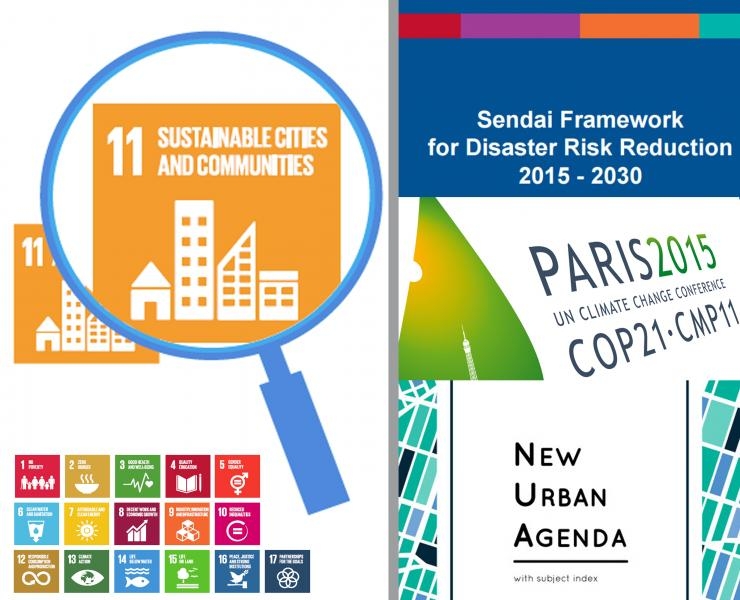[20 June 2018] -- In April, Cities Alliance issued a call for best practices that take an integrated approach to the Follow-up and Review (FuR) process for the global sustainability agendas (2030 Agenda, Paris Agreement, Sendai Framework or New Urban Agenda) at the local level.
In a system that builds exceedingly on monitoring national governments, Cities Alliance wants to ensure that local voices are heard. For this reason, we invited local and regional governments, civil society and the private sector to share experiences that show how the global agendas are being integrated and translated into local strategies to address local needs.
We are delighted to announce that five best practices have been selected from Asia, Europe and Latin America. Three of the winning projects –Monitoreo CDMX, #weResilient, and Measuring Progress Toward the Sustainable Development Goals in Urban Contexts – will be invited to participate in activities linked to the UN High Level Political Forum (HLPF) on Sustainable Development in New York 9-13 July 2018, where progress on the 2030 Agenda will be reviewed, including a review of SDG 11 – the goal on cities and human settlements.
By showcasing their different approaches, the projects will inform global discussions and efforts on how local actors are accelerating the implementation of the global agendas.
All five projects make significant local contributions to an integrated approach to monitor and report on the progress of the global sustainability agendas. While the agendas are traditionally monitored by different national governments, our projects demonstrate initial steps on how to align the agendas at the local level and the importance of locally collected data to feed into regional, national and global FuR processes. After all, it is in the cities where the agendas are implemented and where progress is made.
The five winning best practises
-- Monitoreo CDMX (Mexico City, Mexico)
Monitoreo CDMX is an online tool collecting data on a set of indicators that allows Mexico City’s local administration to track progress on the 2030 Agenda and verify compliance with the SDGs. The project stood out for its innovative open data recording system which enables numerical, graphical and tabular queries about the data’s impact on the SDG indicators.
-- #weResilient (Potenza, Italy)
#weResilient is a local governance and accountability model for territorial and community resilience. Around 100 municipalities in Potenza came together to develop a regional strategy for integrating disaster-risk reduction and climate change resilient policies in urban planning. Potenza’s data tracks progress on the implementation of global sustainability agendas, and its experiences have been recognised by the United Nations as a role model. They demonstrate a strong engagement of key stakeholders, social groups and citizens in the institutional policymaking regarding territorial and urban sustainable and resilient development.
-- Measuring Progress Toward the Sustainable Development Goals in Urban Contexts (Red de Ciudades Cómo Vamos, Colombia)
This project is a civil society-led initiative to create sub-national sets of indicators and to develop a public online data tool. Citizens will be able to learn, track and monitor progress on the SDGs in 19 Colombian urban agglomerations. The project demonstrates a particularly innovative partnership between civil society, university, private sector and different levels of government working together to collect and validate the data.
-- City Footprint Project (SASA-Servicios Ambientales S.A., Latin America)
The City Footprint Project (Proyecto Huella de Ciudades) is an initiative supporting local governments in Latin America to implement climate mitigation and adaptation strategies. An annual evaluation of the cities’ carbon and water footprints demonstrates local contributions to the achievement of the global agendas and informs their monitoring processes. The project has a South-South learning component, in which cities share their best practices and create technical and political guidelines for other cities to implement similar initiatives.
-- Marunda Urban Resilience in Action (Cordaid, Indonesia)
This project supports slum dwellers in mapping and analysing resilience vulnerabilities of their communities and developing action plans through a multi-stakeholder approach. The locally-collected data informs Indonesia’s efforts to develop national SDG indicators and action plans. The project demonstrates the importance of data from grassroots organisations to national monitoring processes. In sensitive contexts such as informal settlements, the approach provides information that the government otherwise would not be able to obtain.

All five projects make significant local contributions to an integrated approach to monitor and report on the progress of the global sustainability agendas.
Related Items:




